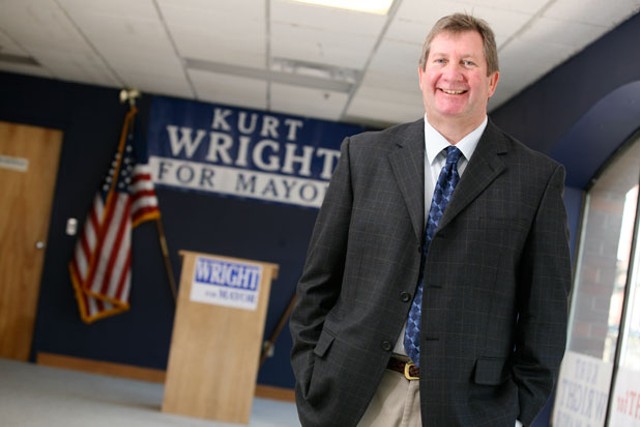Published February 4, 2009 at 6:34 a.m. | Updated August 6, 2019 at 7:25 p.m.
If politics makes for strange bedfellows, Kurt Wright’s mayoral candidacy may be remembered one day as Burlington’s weirdest orgy. Newcomers to Queen City politics will be excused if they can’t make heads or tails of Wright’s political alliances based on who’s backing the Ward 4 city council president and Republican state lawmaker. His supporters include a longtime Democrat and environmentalist, a prominent developer and philanthropist, and a member of the National Lawyers Guild and former ’60s radical. Recently, Wright nabbed the much-coveted endorsement of the firefighters’ union. As one longtime GOP supporter quipped recently, Wright may want to remind voters, and himself, that a few Republicans are endorsing him, too.
Such is the unlikely trajectory of Wright’s political career. A straight-talking, working-class Republican from the New North End who never finished college, he has defied the odds by repeatedly getting elected in one of Vermont’s most highly educated, left-leaning cities. Granted, it probably says just as much about the ideological maturity of Burlington voters that they’ve been willing to overlook the “R” after Wright’s name and judge him instead on his deeds.
Still, Wright is about to face his toughest political challenge yet: trying to beat three well-respected candidates and become Burlington’s first Republican mayor since Peter Brownell’s single term ended in 1995. Complicating that effort will be Burlington’s relatively new system of instant runoff voting, or IRV — in which voters can rank the candidates in order of preference, and which has dumbfounded even seasoned campaign strategists.
But if anyone is up to the task, it’s Wright. Arguably the most politically savvy of the five mayoral candidates — Green Party candidate James Simpson threw his hat into the ring last week, just minutes before the filing deadline — Wright is hoping this race will be a referendum on the candidates’ leadership abilities and not their political affiliations. If that’s the case, he stands a good chance of winning, considering the alliances he’s forged in recent years.
“I’m looking for a strong leader who’s willing to step in there and do what’s necessary,” says self- described liberal, smart-growth advocate and Wright supporter John Ewing. “[Independent candidate] Dan Smith can’t do it. He’s a total neophyte in the city and would have a long learning curve. [Democratic candidate] Andy [Montroll] has the experience but lacks the leadership qualities. The mayor is a zero, so Kurt’s the guy.”
But other Burlington voters will look more closely at Wright’s record — not on city council, where he’s served stints from 1995 to 1999 and from 2005 to the present, but at the Statehouse. As the only Burlington Republican in the House of Representatives, Wright has a record that’s tricky to nail down. It has some politicos wondering which Wright Burlington would get as its mayor: the moderate council president, or the more conservative House rep who’s often aligned himself with Republican Gov. Jim Douglas?
Last week, Seven Days sat down with Wright at his Vine Street house in the New North End to find out. Greeting us at the door was the family golden retriever, Torre, named after longtime New York Yankees Manager Joe Torre. Wright jokes that he’s more worried about losing votes for his baseball loyalties than for his association with Montpelier Republicans.
Still, his GOP roots run deep. Wright, 52, was born and raised in Vergennes, one of six children. (Interestingly, he’s the only one of his siblings still living in Vermont.) For years, Wright’s father owned Vergennes Motors, a Pontiac dealership; his mother attended Castleton State College and taught public school for a short time before leaving to raise her kids. Both of Wright’s parents died in the last few years.
Wright, who described himself as a “political junkie” even in high school, moved to Burlington in 1978 and has lived there ever since. For a time, he studied accounting at Champlain College, but never earned a degree — a decision he calls “one of my big regrets.” He married his high school sweetheart, Kim, who now works as the business office manager at Burlington Health and Rehab Center. They have no children.
To many Burlington residents, Wright is also known as the longtime manager of Kerry’s Kwik Stop, the St. Paul Street convenience store, which earned him his moniker of “Kwik Stop Kurt” from late Seven Days columnist Peter Freyne. More recently, in the off-season, Wright has worked a sales route for Ben’s, a food-delivery service based in Hinesburg.
Wright launched his political career as a long shot in 1994, when he challenged Burlington Democrat Carmel Babcock for her House seat. Although no one gave Wright much of a chance of beating the 20-year incumbent, Wright came within a hair’s breadth of defeating her; in a recount, he lost by five votes. “That was my introduction to elective politics,” Wright recalls.
Several months later, Wright took on another popular Democrat, then-City Councilor Bill Aswad, and this time he defeated the incumbent. Wright went on to serve two terms in the council’s minority, where he describes his role as “a watchdog for taxpayers.”
In 1999, Wright left the council to challenge Progressive Mayor Peter Clavelle, but was soundly defeated. Looking back, he acknowledges that he was more conservative then and “a little too rigid . . . I’ve become more of a centrist. I think it’s really beneficial to leave the council, as I did, and then come back.”
In 2000, Wright ran for the legislature during one of the most contentious periods in its history — shortly after Vermont’s civil-union vote — and won. According to Wright, his victory had less to do with the gay-marriage debate than it did with opposition in his district to Act 60, which fundamentally altered how Vermont’s public schools are funded.
Since then, Wright has been re-elected to the House four times. In 2005, he returned to Burlington City Council; in 2007, a divided council elected Wright its president, a post he still holds.
Jane Knodell, the outgoing Progressive councilor from Ward 2, served on the council during both of Wright’s tenures. She describes him as “a very strong city council president” who has a knack for communicating well and for seeing “the big picture” on many issues.
Knodell, who emphasizes that she’s made no endorsements in this year’s mayoral race, says she’s not familiar with Wright’s record in Montpelier. But as a councilor, she hasn’t seen his Republican roots showing much.
“We’ve both moved to the center,” Knodell says. “He’s a very different councilor now than the person I knew back in the ’90s . . . In the last three years, I can’t think of a single vote where I voted differently than he did.”
Burlington College professor, attorney and longtime lefty Sandy Baird has endorsed Wright. Baird, who ran for mayor herself on the Green Party ticket in 1989, admits she hasn’t always agreed with Wright on every issue, but says he’s “open-minded, fairly flexible, and listens to me . . . and he’s always been easy to work with.”
Ideologically, Baird knows that some voters won’t warm to the idea of supporting a Republican, even a “moderate” like Wright. But on issues that are important to her, Baird sees Wright as the strongest of the five candidates — as evidenced by his opposition to Clavelle’s plan to move the YMCA into the Moran Plant, his bipartisan resolution to hold a public dialogue with Burton on its controversial snowboard designs, and his willingness to tackle issues of violence against women and children.
“What I’m looking for in a candidate on the local level is a person who always acts in the best interest of the city,” she adds. “And, in my experience, Kurt always tries to do that.”
But not everyone is so willing to overlook Wright’s conservative record and reputation in Montpelier. What is that record? Depends on whom you ask. On issues important to the business community, Wright has earned high marks. For example, during the 2001-02 biennium, he earned an 86 (out of 100) score from the Vermont National Federation of Independent Business (NFIB) and a 94 from the Vermont Chamber of Commerce. In 2003-04, Wright earned his highest score yet — a 100 — from the Chamber, though by the 2005-06 biennium, his grades from the Chamber and the NFIB both slipped — to 61 and 71, respectively.
On environmental scorecards, Wright has fared worse, from a low score of zero in 2003-04 from the League of Conservation Voters, to a high of just 46 in 2005-06. Ditto on government reform legislation, where the Vermont Public Interest Research Group (VPIRG) gave him an 11 in 2003-04 and a 40 in 2005-06.
In fact, the national watchdog group Project Vote Smart, whose bipartisan membership includes such diverse figures as Newt Gingrich and George McGovern, notes on its website, “Representative Kurt Wright repeatedly refused to provide any responses to citizens on the issues through the 2008 Political Courage Test when asked to do so . . .”
Wright brushes aside that slight, arguing, “There comes a time when you get survey after survey after survey . . . and you get stuck answering questions that try to pigeonhole you.” Wright says he prefers going door to door answering voters’ questions to spending his time responding to every national survey that arrives in the mail.
“I think people find me to be very responsive to my constituents,” he adds. “That’s why I get re-elected.”
Still, while some local politicos say that Wright the councilor has mellowed since the ’90s, his House record remains as conservative as ever.
“I actually think Kurt has matured a lot in the political sphere by being city council president,” notes Betsey Krumholz, a longtime Ward 4 Democrat. “It has done a tremendous amount for his not being able to shoot from the hip . . . I just wish he had that same trajectory in the legislature.
“You can buy two beers at a time in a bar because of him,” Krumholz adds. “That’s Kurt’s big contribution to the statewide political scene.”
Former Democratic city councilor, state rep and self-described friend Bill Keogh served with Wright both on city council and in the House. Keogh (who’s endorsed Montroll for mayor) thinks Wright has been a “fair and evenhanded council president.” But in Montpelier, “Kurt is a Republican through and through, and he often follows the party line.”
State Rep. Mark Larson (D-Burlington) agrees. Larson hasn’t worked with Wright on Burlington issues, but has watched him try to cultivate a persona as a tripartisan consensus-builder.
“I’m not sure that would be his reputation in Montpelier,” Larson asserts. “If anything, his reputation is as a pretty loyal surrogate for the governor and his party. Frankly, I can’t remember a major issue in my eight years in the legislature where he’s built a cross-party coalition to move an issue forward.”
In fairness, that’s not the universal opinion of Wright under the golden dome. Francis Brooks, the former Democratic rep from Montpelier who now serves in the nonpartisan job of Sergeant-at-Arms, chaired the General, Housing and Military Affairs Committee, on which Wright also served. Brooks remembers Wright as working well across party lines and was “impressed” with his knowledge of the issues that came before their committee.
“Regardless of the issue, he was always a gentleman,” Brooks recalls. “Now, he may be fighting like the devil to kill what you’re supporting, but . . . I could always talk to him, and he could always talk to me.”
For his part, Wright is unapologetic about his Statehouse record and insists he’s not as partisan or as rigid as his critics suggest.
“I think that Montpelier is a different place than Burlington is,” Wright admits. “I’ve been a passionate advocate on some issues, and if you didn’t like those issues, then sometimes you didn’t like [my position].”
He also points to several issues where he’s broken ranks with fellow Republicans, including his support for medical marijuana and for a bill that would replace the electoral college with a national popular vote. Wright says he’s also focused his attention on sentencing reform and bills that protect victims’ rights.
For example, he supported efforts to adopt a civil commitment law, a plan he first learned about from Democratic Attorney General Bill Sorrell. Wright is currently working on another bill to allow into court testimony on a defendant’s record of “prior bad acts.” As Wright explains, this legislation, modeled after federal rules of evidence, would help prosecutors establish a pattern of abuse, thus making it easier for them to win convictions of certain violent offenders.
Ultimately, however, Wright is hoping that Burlington voters will focus on his record of building bridges in Burlington, not on how he acts in the more partisan atmosphere of Montpelier.
“I don’t think this race is going to be about party politics. There will always be people who try to make it that,” he says. In fact, despite several requests to run as an independent, Wright decided to stick with what works. “My campaign is the most independently based campaign. I’m just running as who I am.”
Editor's Note:
This is the second in a series of profiles of the candidates running for Burlington mayor. Four of the five candidates will be participating in a mayoral debate moderated by Seven Days on Wednesday, February 4, 7-9 p.m. at the Film House, Main Street Landing Performing Arts Center, in Burlington. Admission is free.
See Ken Picard discuss our series of mayoral profiles on this week’s episode of “Inside Seven Days.” Find it on channel 16, RETN, Thursday, February 5, at 8 p.m. or at click here.
More By This Author
Speaking of...
-

Burlington Mayor Emma Mulvaney-Stanak’s First Term Starts With Major Staffing and Spending Decisions
Apr 17, 2024 -

Totally Transfixed: A Rare Eclipse on a Bluebird Day Dazzled Crowds in Northern Vermont
Apr 10, 2024 -

Middlebury’s Haymaker Bun to Open Second Location in Burlington’s Soda Plant
Apr 9, 2024 -

Police Search for Man Who Set Fire at Sen. Bernie Sanders' Burlington Office
Apr 5, 2024 -

Self-Serve Farmstands Hold Tight to Their Honor-System Payment Model
Mar 27, 2024 - More »
Comments
Comments are closed.
From 2014-2020, Seven Days allowed readers to comment on all stories posted on our website. While we've appreciated the suggestions and insights, right now Seven Days is prioritizing our core mission — producing high-quality, responsible local journalism — over moderating online debates between readers.
To criticize, correct or praise our reporting, please send us a letter to the editor or send us a tip. We’ll check it out and report the results.
Online comments may return when we have better tech tools for managing them. Thanks for reading.














































